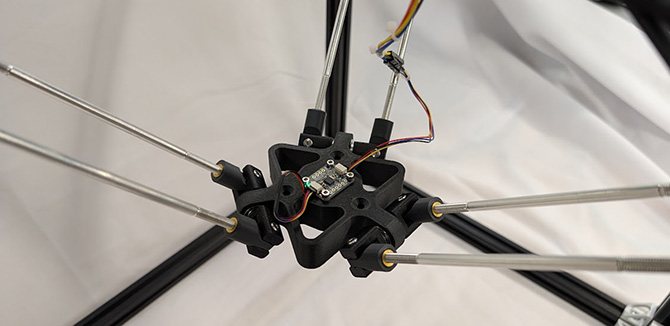Delta Force
Sharwin Patil (MSR ‘25) went from tinkering with Legos to creating an open-source ROS package for Delta robots.

Sharwin Patil (MSR '25) spent countless hours as a child tinkering with Lego kits, rubber bands, and popsicle sticks, bringing mechanized creations to life.
Those projects inspired him to continue creating.
Now, as a student in Northwestern Engineering's Master of Science in Robotics (MSR) program, Patil developed an open-source software package that filled what he saw as a gap in the robotics community.
Patil's independent project focused on creating a versatile Robot Operating System (ROS) package for Delta robots, a type of parallel robot known for its precision and speed in industrial applications. These robots thrive in manufacturing environments for tasks such as pick-and-place jobs, Patil said.
The package he developed allows for various configurations of Delta robots, regardless of size, link lengths, or motor types.
The significance of Patil's work lies in its potential to streamline robotics development for both hobbyists and companies. By providing a ready-made solution for the complex mathematics and kinematics involved in Delta robot control, Patil’s package could save developers significant time and effort.
He knew heading into the project he wanted to create an open-source solution.
“I wanted to make something that anybody and everyone can benefit from,” Patil said. “I used ROS 2, which is a very popular open source framework for robotics, and it has a really deep community online.”
Patil was exposed to ROS prior to MSR, but he didn't delve deep into the system until he was in MSR. He also credits the program — specifically Center for Robotics and Biosystems director Kevin Lynch — with helping deepen his knowledge and understanding of robotic manipulation.
Prior to MSR, Patil spent his middle school and high school years in competitive robotics. It was there where he began to learn about strategizing and engineering processes.
He built on that knowledge at Northeastern University, where he earned his Bachelor of Science in computer science and computer engineering. Patil considered a number of graduate programs, but he said a conversation with director Matthew Elwin helped differentiate MSR from other programs.
"MSR has really good project opportunities, and that's a critical component of our field of work," Patil said. "Within a technical field like robotics, you can't get everything just from simulation. You can't get all the knowledge just from working on your laptop. You need to deal with physical hardware and you need to experiment with new projects."
Patil said the number of projects MSR students completed during their time in the program exceeded other schools he applied to. The projects in MSR also seemed to bring more learning and growth opportunities, he said.
"You do a lot of these projects on your own time, and you essentially make your own plan," he said. "This forces you to go through all of the engineering steps, and you just learn more. At the end of the day, you have so much more to show for yourself."

